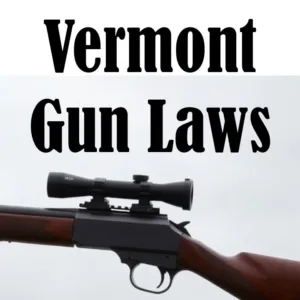Vermont is known for its permissive gun laws, often referred to as “constitutional carry.” This guide provides an overview of firearm regulations in Vermont, covering topics such as open and concealed carry, purchasing firearms, restricted locations, and self-defense rights.
Vermont Gun Laws Overview

Purchasing Firearms in Vermont
Vermont does not require permits or licenses to purchase firearms. The state has few restrictions, making the process straightforward for residents.
Key Requirements:
- Permit to Purchase: Not required for any type of firearm.
- Background Check: Required only for purchases from licensed dealers; not mandated for private sales.
- Waiting Period: There is no waiting period for firearm purchases in Vermont.
- Minimum Age: Vermont law requires a minimum age of 21 to purchase firearms, with certain exceptions for those aged 18–20 in the military or law enforcement.
Firearm Licensing in Vermont
Vermont does not require any kind of general firearm license or permit to own or carry firearms, making it one of the most permissive states regarding firearm ownership.
Private Sales and Background Checks
Background checks are not required for private sales in Vermont. However, federal law prohibits private sellers from selling firearms to individuals they know or reasonably believe to be prohibited from owning guns.
Open Carry in Vermont
Vermont allows open carry of firearms without a permit for those 16 years of age and older. This means that individuals can openly carry both handguns and long guns in most public spaces.
Key Points on Open Carry:
- Permitless Open Carry: Open carry is permitted for residents 16 and older without a permit.
- Vehicle Carry: Firearms may be carried openly or concealed in a vehicle without restrictions.
Concealed Carry in Vermont
Vermont is a “constitutional carry” state, meaning individuals may carry concealed firearms without a permit.
Concealed Carry without a Permit:
- Eligibility: Any legal adult (16+) can carry a concealed firearm without a permit, though most carriers are typically over 18.
- Permit Availability: Vermont does not issue concealed carry permits, as permits are not required for any form of carry within the state.
Reciprocity with Other States
Since Vermont does not issue concealed carry permits, there is no reciprocity for Vermont residents with other states. However, Vermont residents traveling to states that recognize constitutional carry may carry without a permit in those locations.
Restricted Locations for Carrying Firearms in Vermont
While Vermont is permissive in allowing carry without a permit, there are some restricted areas where carrying firearms is prohibited.
- Schools and Educational Facilities: Firearms are generally prohibited on school property, including K-12 and certain higher education institutions.
- Federal Buildings: Firearms are not allowed in federal buildings, including post offices and courthouses.
- Private Property: Private property owners may prohibit firearms on their premises, and individuals must comply with any posted signage.
- State Buildings: Certain state buildings may also prohibit firearms.
Assault Weapons and Magazine Capacity in Vermont
Vermont has some restrictions on magazine capacity for handguns and long guns:
- Handguns: Limited to 15 rounds.
- Rifles: Limited to 10 rounds. These restrictions do not apply to firearms that were owned before October 1, 2018, when the law was enacted.
Self-Defense Laws in Vermont: Castle Doctrine
Vermont does not have a specific Stand Your Ground law, but it follows the Castle Doctrine, allowing individuals to defend themselves in their homes if they feel threatened.
Castle Doctrine
Under Vermont’s Castle Doctrine, residents are not required to retreat when defending themselves within their home or property. This allows for the use of reasonable force, including deadly force, if faced with an imminent threat of harm.
Firearms Prohibited Persons in Vermont
Vermont prohibits certain individuals from possessing firearms in accordance with both state and federal laws.
- Felony Convictions: Individuals with felony convictions are generally prohibited from firearm ownership.
- Domestic Violence Convictions: Those with domestic violence convictions or active restraining orders are restricted from possessing firearms.
- Mental Health Restrictions: Individuals deemed mentally unfit by a court may face restrictions on firearm ownership.
- Drug and Alcohol Abuse: Persons with recent drug-related convictions or substance abuse issues may be prohibited from possessing firearms.
Penalties for Violating Gun Laws in Vermont
Violating Vermont’s gun laws can result in criminal penalties, including fines, imprisonment, and possible restrictions on firearm ownership.
- Unlawful Possession: Possession of a firearm by a prohibited person or in restricted areas can lead to charges.
- Magazine Capacity Violations: Possession of a magazine exceeding Vermont’s legal capacity limit (post-2018) can lead to legal consequences.
- Carrying in Prohibited Areas: Carrying firearms in restricted locations may lead to fines and other penalties.
Conclusion: Understanding Vermont’s Gun Laws
Vermont’s gun laws offer significant freedom to residents and visitors, with no permit requirements for open or concealed carry. However, individuals should remain aware of restricted locations, magazine capacity limits, and prohibited persons to ensure lawful firearm use.
FAQs About Gun Laws in Vermont
1. Do I need a permit to buy a gun in Vermont?
No, Vermont does not require a permit to purchase firearms.
2. Is open carry allowed in Vermont?
Yes, open carry is allowed without a permit.
3. Does Vermont restrict magazine capacity?
Yes, Vermont restricts magazine capacity to 15 rounds for handguns and 10 rounds for rifles, with exemptions for firearms owned before 2018.
4. Does Vermont recognize out-of-state concealed carry permits?
No, Vermont does not issue permits and does not have reciprocity with other states.
5. What self-defense laws apply in Vermont?
Vermont follows the Castle Doctrine, allowing self-defense without a duty to retreat within one’s home.
